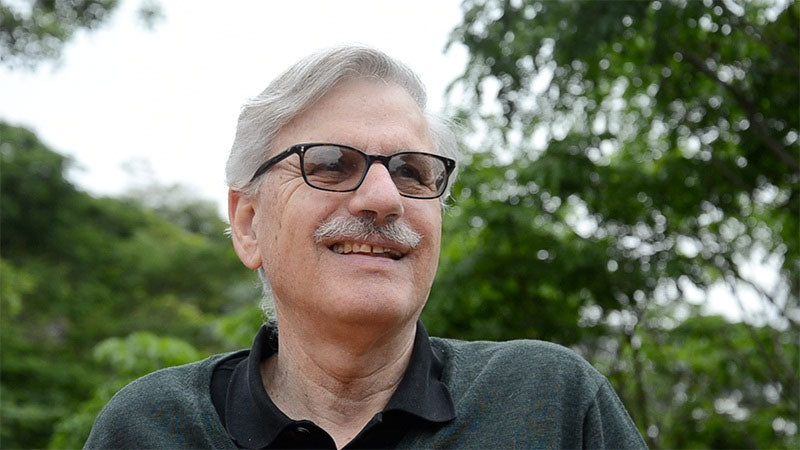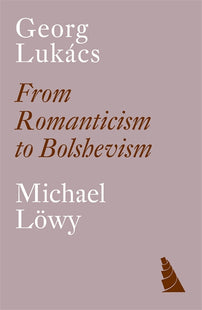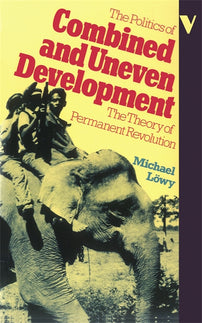Karl Marx and Ecology: An Interview with Michael Löwy
While some ecologists remain critical of Marxism and skeptical about how much Marx can offer the environmental movement, Michael Löwy argues that Marx's writing can help us understand the relationship between nature, capitalism, and wealth formation.

**This interview was originally published in Revue L’Anticapitaliste 142 in January 2023.
It is undeniable that Marx was interested in the environmental problems of his time, and criticised the damage caused by the capitalist mode of production. But it has to be said that ecological themes do not occupy a central place in Marxian theory, and that Marx’s writings on the relationship between human societies and nature are far from unambiguous and therefore open to different interpretations.
Many ecologists are critical of Marx and urge Marxists to abandon the red paradigm and adopt the green one. What are their main arguments?
According to the ecologists, Marx, following in the footsteps of the English economist David Ricardo, attributed the origin of all value and wealth to human labour, neglecting the contribution of nature. This criticism stems from a misunderstanding: Marx uses the theory of labour-value to explain the origin of exchange-value within the capitalist system. On the other hand, nature is involved in the formation of real wealth, which is not exchange-value but use-value. This position is very explicitly articulated in Marx’s Critique of the Gotha Programme (1875), a text directed against the ideas of the German socialist Ferdinand Lassalle and his followers:
Labour is not the source of all wealth. Nature is just as much the source of use-values (and surely these are what make up material wealth!) as labour. Labour is itself only the manifestation of a force of nature, human labour power.[1]
[book-strip index="1"]
Ecologists accuse Marx and Engels of productivism. Is this accusation justified?
No, insofar as no one denounced the capitalist logic of production for production’s sake, the accumulation of capital, wealth, and commodities as an end in itself, more than Marx did. The very idea of socialism – in contrast to its miserable bureaucratic counterfeits – is that of the production of use-values, goods needed for the satisfaction of human needs. The supreme objective of technical progress, according to Karl Marx, is not the infinite increase of goods (‘having’), but the reduction of the working day and the increase of free time (‘being’).[2]
However, it is true that Marx and Engels (and even more so later Marxists) are often uncritical of the system of industrial production created by capital and tend to make the ‘development of the productive forces’ the main vector of progress. From this point of view, the ‘canonical’ text is the famous preface to the Contribution to the Critique of Political Economy (1859), one of Marx’s writings most marked by a certain evolutionism, by the philosophy of progress, by scientism (the model of the natural sciences) and by an unproblematic view of the productive forces:
At a certain stage of development, the material productive forces of society come into conflict with the existing relations of production [...]. From forms of development of the productive forces these relations turn into their fetters. Then begins an era of social revolution. [...] No social order is ever destroyed before all the productive forces for which it is sufficient have been developed.[3]
In this famous passage, the existing productive forces are not called into question, and the only task of the revolution is to abolish the relations of production that have become a ‘fetter’ on their unlimited development.
The following passage from the Grundrisse (the 1857-59 prequel to Capital) is a good example of Marx’s rather too uncritical admiration for the ‘civilising’ work of capitalist production and its brutal instrumentalisation of nature:
Thus capital creates the bourgeois society, and the universal appropriation of nature as well as of the social bond itself by the members of society. Hence the great civilising influence of capital; its production of a stage of society in comparison to which all earlier ones appear as mere local developments of humanity and as nature-idolatry. For the first time, nature becomes purely an object for humankind, purely a matter of utility; ceases to be recognised as a power for itself; and the theoretical discovery of its autonomous laws appears merely as a ruse so as to subjugate it under human needs, whether as an object of consumption or as a means of production.[4]
This still uncritical view of capitalism’s relationship with nature would be superseded in the years that followed. In fact, Marx’s (and Engels’s) writings on nature should be seen not as a uniform block, but as thought in motion. This is the argument made in a recent book by a young Japanese researcher, Kohei Saito, Karl Marx’s Ecosocialism. Capitalism, Nature, and the Unfinished Critique of Political Economy (New York: Monthly Review Press, 2017): he shows the evolution of Marx’s reflections on the natural environment, in a process of learning, rectification and reformulation of his thought.
Admittedly, on certain questions, there is great continuity in Marx’s writings. This is particularly true of his rejection of the capitalist ‘separation’ between human beings and the land, i.e. nature. Marx was convinced that in primitive societies there existed a kind of unity between producers and the land, and he saw it as one of the important tasks of socialism to re-establish this unity, destroyed by bourgeois society, but on a higher level (negation of the negation). This explains Marx’s interest in pre-modern communities, both in his ecological thinking and in his anthropological study – drawing respectively on Carl Fraas and Franz Maurer, two authors he considered to be ‘unconscious socialists’.
But on most questions about the environment, Saito highlights notable changes. Before Capital (1867), Marx’s writings were rather uncritical of capitalist ‘progress’. This is evident in the Communist Manifesto, which celebrates the ‘subjugation of the forces of nature’ and the ‘clearing of entire continents’ by the bourgeoisie.
The changes begin in 1865-66, when Marx discovered, through the writings of the agricultural chemist Justus von Liebig, the problems of soil depletion and the metabolic breakdown between human societies and nature. This led him, in Volume One of Capital (1867) as well as in the other two unfinished volumes, to take a much more critical view of the damage caused by capitalist ‘progress’.
Thus, in several passages of Capital that concern agriculture, we see the emergence of a genuine ecological problematic and a radical critique of the catastrophes resulting from capitalist productivism. Marx puts forward a kind of theory of the breakdown of the metabolism between human societies and nature resulting from capitalist productivism. The expression ‘Riß des Stoffwechsels’, or ‘metabolic rift’ (literally ‘rift in material exchange’), appears in a passage in chapter 47, ‘The Genesis of Capitalist Ground Rent’, of Volume Three of Capital:
On the one hand, large landed property reduces the agricultural population to an ever decreasing minimum and confronts it with an ever growing industrial population crammed together in large towns; in this way it produces conditions that provoke an irreparable rift (unheilbaren Riß) in the interdependent process of social metabolism (Stoffwechsel), a metabolism prescribed by the natural laws of life itself.[5]
As in most of the examples we will go on to see, Marx’s attention is focused here on agriculture and the problem of soil devastation, but he links this question to a more general principle: the rupture in the system of material exchange (Stoffwechsel) between human societies and the environment, in contradiction with the ‘natural laws’ of life.
The theme of ‘metabolic rift’ is also found in a passage in Volume One of Capital. This is a text in which Marx discusses most explicitly the ravages wrought by capital on the natural environment; a dialectical vision of the contradictions of the ‘progress’ induced by the productive forces then emerges:
Capitalist production [...] disturbs the metabolic interaction (Stoffwechsel) between man and the earth… hence it hinders the operation of the eternal natural condition for the lasting (dauernder) fertility of the soil. [...]
Moreover, all progress in capitalist agriculture is a progress in the art, not only of robbing the worker, but of robbing the soil; all progress in increasing the fertility of the soil for a given time is a progress towards ruining the more long-lasting sources of that fertility. The more a country proceeds from large-scale industry as the background of its development, as in the case of the United States, the more rapid is this process of destruction. Capitalist production, therefore, only develops the techniques and the degree of combination of the social process of production by simultaneously undermining (untergräbt) the original sources of all wealth – the soil and the worker.[6]
Several aspects are notable in this text: first of all, the idea that progress can be destructive, a ‘progress’ in the deterioration and destruction of the natural environment. Here, the exploitation and degradation of workers and nature are placed in parallel, as the result of the same predatory logic that prevails in the development of capitalist industry and agriculture.
This direct association made by Marx between the exploitation of the proletariat and the exploitation of the soil is a good starting point for thinking about the link between class struggle and the struggle to defend the environment, in a common struggle against the domination of capital.
After the exhaustion of the soil, the other example of ecological catastrophe frequently mentioned by Marx and Engels is the destruction of forests. It appears several times in Capital:
The development of civilisation and of industry in general has always shown itself so active in the destruction of forests that everything that has been done for their conservation and production is completely insignificant in comparison.[7]
The two phenomena – the degradation of forests and that of the soil – are closely linked in their analyses.
[book-strip index="2"]
How do Marx and Engels define the socialist programme in relation to the natural environment?
The two thinkers often seem to conceive of socialist production as the collective appropriation of the forces and means of production developed by capitalism: once the ‘fetters’ represented by the relations of production, and in particular the relations of ownership, had been abolished, these forces would be able to develop without hindrance. There would thus be a kind of substantial continuity between the capitalist productive apparatus and that of socialism, with socialism involving above all the planned and rational management of the material civilisation created by capital.
For example, in the famous conclusion to the chapter on the primitive accumulation of capital, Marx writes:
The monopoly of capital becomes a fetter upon the mode of production which has flourished alongside and under it. The centralisation of the means of production and the socialisation of labour reach a point at which they become incompatible with their capitalist integument. This integument is burst asunder. The knell of capitalist private property sounds. [...] Capitalist production begets, with the inexorability of a natural process, its own negation.[8]
Aside from the fatalistic and positivist determinism that characterises it, this passage seems to leave intact, in the socialist perspective, the entire mode of production created ‘alongside and under’ capital, calling into question only the ‘integument’ of private property, which has become ‘incompatible’ with the material wellsprings of production.
However, there are also other writings that take into account the ecological dimension of the socialist programme and open up some interesting avenues. A number of passages in Marx’s writings seem to regard the conservation of the natural environment as a fundamental task of socialism. For example, Volume Three of Capital contrasts the capitalist logic of large-scale agricultural production, based on the exploitation and waste of the forces of the soil, with another logic, socialist in nature: the ‘conscious and rational treatment of the land as permanent communal property, and as the inalienable (unveräußerlichen) condition of for the existence and reproduction of the chain of successive human generations (p. 949)’. Similar reasoning is found a few pages earlier:
Even an entire society, a nation, or all simultaneously existing societies taken together, are not the owners of the earth. They are simply its possessors, its beneficiaries (Nutznießer), and have to bequeath it in an improved state to succeeding generations, as boni patres familias.[9]
It would not be difficult to find other examples of genuine sensitivity to the question of the natural environment of human activity. The fact remains, however, that Marx and Engels lacked an overall ecological perspective.
While it is true that ecology did not occupy a central place in Marx and Engels’s theoretical and political apparatus – because the ecological crisis was not yet, as it is today, a vital question for humanity – it is no less true that it is impossible to conceive of a critical ecology equal to the contemporary challenges without taking into account Marx’s critique of political economy and his analysis of the breakdown in the metabolism between human societies and nature. An ecology that ignores or scorns Marxism and its critique of commodity fetishism is doomed to be no more than a corrective to the ‘excesses’ of capitalist productivism.
Based on the writings of Marx and Engels, an ecological Marxist movement has developed in the United States, pioneered by John Bellamy Foster, with the participation of Paul Burkett, Brett Clark, Fred Magdoff and several others (and the support of Monthly Review, one of the most important publications of the North American Left), which defines itself as the ‘metabolic rift’ approach. These authors have made a significant contribution to the rediscovery of the ecological dimension in the work of the founders of modern communism, even if their tendency to exaggerate this aspect is open to criticism.
It is impossible to conceive of an ecosocialist alternative to the current process of destruction of the natural foundations of life on the planet without taking into account Marx and Engels’s critique of capitalism, of the blind logic of value, of the brutal subjugation of human beings and nature to the imperatives of capital accumulation. And we cannot envisage a communist future without referring to their proposals: collectivisation of the means of production, production of use-values rather than market values, democratic planning of production and consumption. But, at the same time, we need to integrate into Marxist thinking the ecological challenges of the 21st century: the fight against climate change, the elimination of fossil fuels, the massive reduction of unnecessary production, the development of renewable energies, organic farming instead of the pesticide-based agricultural industry, the recognition of the ecological debt owed to the countries of the South, etc. Marxists of our age must follow the example of Karl Marx: react to the new problems posed by historical change, using the dialectical method.
Translated by David Fernbach
[1] Karl Marx, The First International and After (London: Verso, 2010), p. 341. See also Capital, Volume One (London: Penguin, 1976), p. 134: ‘Labour is therefore not the only source of material wealth, i.e. of the use-values it produces. As William Petty says, labour is the father of material wealth, the earth is its mother.’
[2] On the opposition between ‘having’ and ‘being’, see the 1844 Manuscripts, in Karl Marx, Early Writings (London: Penguin, 1975), p. 361: ‘The less you are, the less you give expression to your life, the more you have, the greater is your alienated life and the more you store up of your estranged life.’ On free time as the principal foundation of socialism, see Capital Volume Three (London: Penguin 1981), p. 959.
[3] Early Writings, p. 426.
[4] Karl Marx, Grundrisse (London: Penguin, 1974), pp. 409-10.
[5] Capital Volume Three, p. 949. The term ‘metabolic rift’ has been popularised by John Foster Bellamy in his important book Marx’s Ecology. Materialism and Nature (New York: Monthly Review Press, 2001), pp. 155-67.
[6] Capital Volume One, pp. 637, 638.
[7] Capital Volume Two (London: Penguin, 1978), p. 322.
[8] Capital Volume One, p. 929. The word ‘socialism’ does not appear in these passages, but it is implicit.
[9] ‘Good householders’; Capital Volume Three, p. 911.

